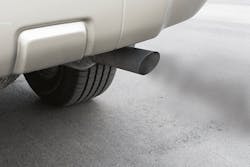Fiat Chrysler Accused of Clean Air Act Violations by EPA
EPA on Jan. 12 issued a notice of violation to Fiat Chrysler Automobiles N.V. and FCA US LLC (collectively FCA) for alleged violations of the Clean Air Act for installing and failing to disclose engine management software in light-duty model year 2014, 2015 and 2016 Jeep Grand Cherokees and Dodge Ram 1500 trucks with 3.0 liter diesel engines sold in the United States.
The undisclosed software results in increased emissions of nitrogen oxides (NOx) from the vehicles. The allegations cover roughly 104,000 vehicles. EPA is working in coordination with the California Air Resources Board (CARB), which has also issued a notice of violation to FCA. EPA and CARB have both initiated investigations based on FCA’s alleged actions.
“Failing to disclose software that affects emissions in a vehicle’s engine is a serious violation of the law, which can result in harmful pollution in the air we breathe,” said Cynthia Giles, assistant administrator for EPA’s Office of Enforcement and Compliance Assurance. “We continue to investigate the nature and impact of these devices. All automakers must play by the same rules, and we will continue to hold companies accountable that gain an unfair and illegal competitive advantage.”
The Clean Air Act requires vehicle manufacturers to demonstrate to EPA – through a certification process – that their products meet applicable federal emission standards to control air pollution. As part of the certification process, automakers are required to disclose and explain any software, known as auxiliary emission control devices, that can alter how a vehicle emits air pollution. FCA did not disclose the existence of certain auxiliary emission control devices to EPA in its applications for certificates of conformity for model year 2014, 2015 and 2016 Jeep Grand Cherokees and Dodge Ram 1500 trucks, despite being aware that such a disclosure was mandatory.
“Once again, a major automaker made the business decision to skirt the rules and got caught,” said CARB Chair Mary D. Nichols. “CARB and U.S. EPA made a commitment to enhanced testing as the Volkswagen case developed, and this is a result of that collaboration.”
By failing to disclose this software and then selling vehicles that contained it, FCA violated important provisions of the Clean Air Act.
FCA may be liable for civil penalties and injunctive relief for the violations alleged in the NOV. EPA also is investigating whether the auxiliary emission control devices constitute “defeat devices,” which are illegal.
In September 2015, EPA instituted an expanded testing program to screen for defeat devices on light duty vehicles. This testing revealed that the FCA vehicle models in question produce increased NOx emissions under conditions that would be encountered in normal operation and use. As part of the investigation, EPA has found at least eight undisclosed pieces of software that can alter how a vehicle emits air pollution.
About the Author

Sandy Smith
Sandy Smith is the former content director of EHS Today, and is currently the EHSQ content & community lead at Intelex Technologies Inc. She has written about occupational safety and health and environmental issues since 1990.
